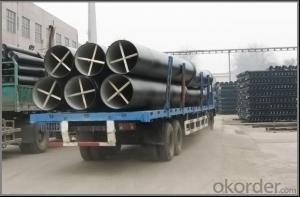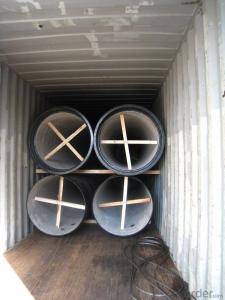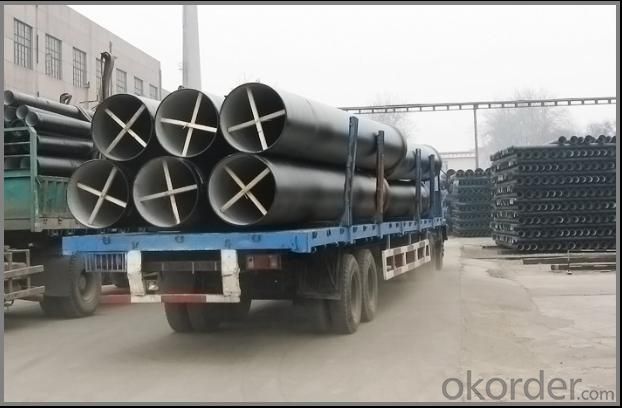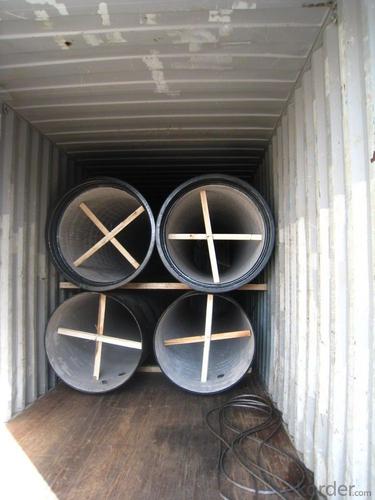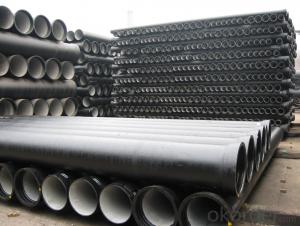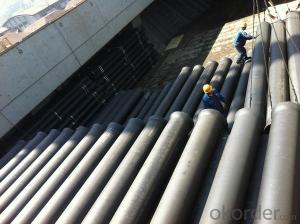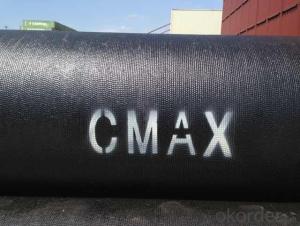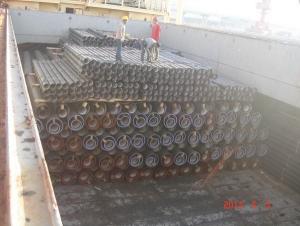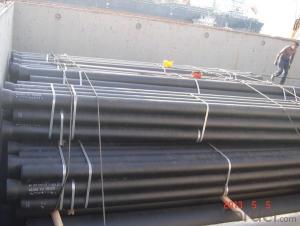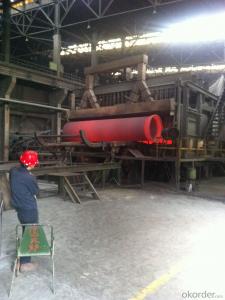DUCTILE IRON PIPE DN1000 K7 CLASS
- Loading Port:
- Tianjin
- Payment Terms:
- TT OR LC
- Min Order Qty:
- -
- Supply Capability:
- 30000Tons m/month
OKorder Service Pledge
OKorder Financial Service
You Might Also Like
CNBM ductile iron pipe ranges from DN80-DN1600mm (T-Type, Class K9), effective length 6m, comply with ISO2531 Standard
Company Profile
CNBM International Corporation is the leading production base and renowned supplier of Ductile Iron Water Pipe systems of both potable and waste water in China. We are constantly looking to develop high quality products to ensure the longest service life and wonderful performance.
CNBM Pipelines regard quality as the essential factor leading to successful business. Every pipe is tested in accordance with BS EN545 (water application) or BS EN598 (sewer application). CNBM Pipelines products comply with and are tested according to the relevant European and International Standards. Our pipes are manufactured under the quality management system BS EN ISO 9001. After years of efforts, CNBM Pipelines has built up great reputation in terms of quality and service among customers worldwide
Product Introduction
CNBM ductile iron pipe ranges from DN80-DN1600mm (Tyton, T-Type, Class K7/K8/K9), effective length: 6m, complying with BS EN545/EN598/ISO2531/BS4772.
Specification& Payment terms
Internal lining: Pipes shall have an internal cement mortar lining in acc with ISO4179.
External coating: Pipes shall be externally coated with metallic zinc spray plus a further layer of resin painting to ISO8179.
Gasket: 100% SBR/NBR/EPDM gasket in accordance with ISO4633.
Packing: Pipes from DN100 to DN300 be bundled with steel belts, the others are in bulk.
Payment term: By 30% T/T advance payment + 70% Irrevocable L/C at sight.
Packing: In bulk vessel or in container.
- Q: How are ductile iron pipes tested for quality?
- Ductile iron pipes are tested for quality through various methods, including hydrostatic pressure testing, dimensional inspection, and mechanical properties testing. Hydrostatic pressure testing involves subjecting the pipes to water pressure to ensure they can withstand the intended operating conditions without any leakage or failure. Dimensional inspection assesses the pipes' dimensions, such as diameter, wall thickness, and length, to ensure they meet the specified standards. Mechanical properties testing evaluates the pipes' tensile strength, yield strength, and elongation to ensure they possess the necessary strength and flexibility. Overall, these rigorous testing procedures help ensure the high quality and reliability of ductile iron pipes.
- Q: Can ductile iron pipes be used for bridge drainage systems?
- Yes, ductile iron pipes can be used for bridge drainage systems. Ductile iron pipes are known for their strength, durability, and resistance to corrosion, making them suitable for various applications, including bridge drainage systems. They can effectively handle the flow of water and withstand the weight and pressure of vehicles passing over the bridge.
- Q: Can ductile iron pipes be used for water supply in buildings?
- Yes, ductile iron pipes can be used for water supply in buildings. Ductile iron pipes are known for their strength, durability, and corrosion resistance, making them suitable for carrying water in both residential and commercial structures. They have a long lifespan, high pressure rating, and can withstand various environmental conditions, making them a reliable choice for water distribution systems.
- Q: The difference between spheroidal graphite cast iron pipe and HDPE water supply pipe
- As the HDPE pipe is made of hot melt connection, the construction is more difficult, and the installation cost is about 40% higher than that of the nodular cast iron pipe.
- Q: What is the typical diameter range of ductile iron pipes?
- The typical diameter range of ductile iron pipes varies depending on the specific application and industry standards. Generally, ductile iron pipes come in a wide range of diameters to accommodate various needs. In water distribution systems, the typical diameter range can vary from as small as 3 inches (76 mm) to as large as 64 inches (1626 mm) or even larger. For sewer and wastewater systems, the typical diameter range is usually between 4 inches (102 mm) to 48 inches (1219 mm). However, it is important to note that these ranges are not exhaustive and there may be instances where ductile iron pipes are available in sizes outside of these common ranges. It is always advisable to consult industry standards and specific project requirements to determine the appropriate diameter range for ductile iron pipes.
- Q: What is the weight of ductile iron pipes?
- The weight of ductile iron pipes can vary depending on their size, thickness, and length. Typically, ductile iron pipes can range from a few pounds to several hundred pounds per linear foot.
- Q: Are ductile iron pipes suitable for wastewater treatment plants?
- Ductile iron pipes are highly suitable for wastewater treatment plants. They possess exceptional strength and durability, making them resistant to corrosion. Consequently, these pipes are an excellent choice for managing wastewater, which often contains corrosive elements. Moreover, ductile iron pipes boast remarkable tensile strength and can endure high pressure, critical for the transportation of wastewater in treatment plants. The flexibility of these pipes also permits easy installation and maintenance, ultimately reducing both cost and time required for wastewater treatment plants. In summary, ductile iron pipes are extensively utilized in wastewater treatment plants due to their durability, resistance to corrosion, and their ability to handle the challenging conditions present in such facilities.
- Q: Are ductile iron pipes suitable for use in residential plumbing?
- Yes, ductile iron pipes are suitable for use in residential plumbing. They are known for their durability, strength, and resistance to corrosion, making them a reliable choice for plumbing systems.
- Q: What are the different types of valves available for ductile iron pipe?
- There are several types of valves available for ductile iron pipe, including gate valves, butterfly valves, check valves, ball valves, and globe valves.
- Q: Advantages and disadvantages of ductile iron pipes
- Comparison between ductile iron pipe and universal cast iron pipe: the process of making ductile iron pipe is cast by adding alkaline earth metal or rare metal such as magnesium and calcium in the raw material of common cast iron pipe. The casting process of nodular cast iron pipe casting method and water cooled centrifugal casting hot continuous casting method, which method is water, the world's most advanced technology, different technology of ductile cast iron and cast iron pipe technology performance comparison, not only to maintain the ordinary cast iron pipe corrosion resistance, and has the advantages of high strength and toughness good, thin wall, light weight, impact resistance, bending performance, convenient installation.
Send your message to us
DUCTILE IRON PIPE DN1000 K7 CLASS
- Loading Port:
- Tianjin
- Payment Terms:
- TT OR LC
- Min Order Qty:
- -
- Supply Capability:
- 30000Tons m/month
OKorder Service Pledge
OKorder Financial Service
Similar products
Hot products
Hot Searches
Related keywords
